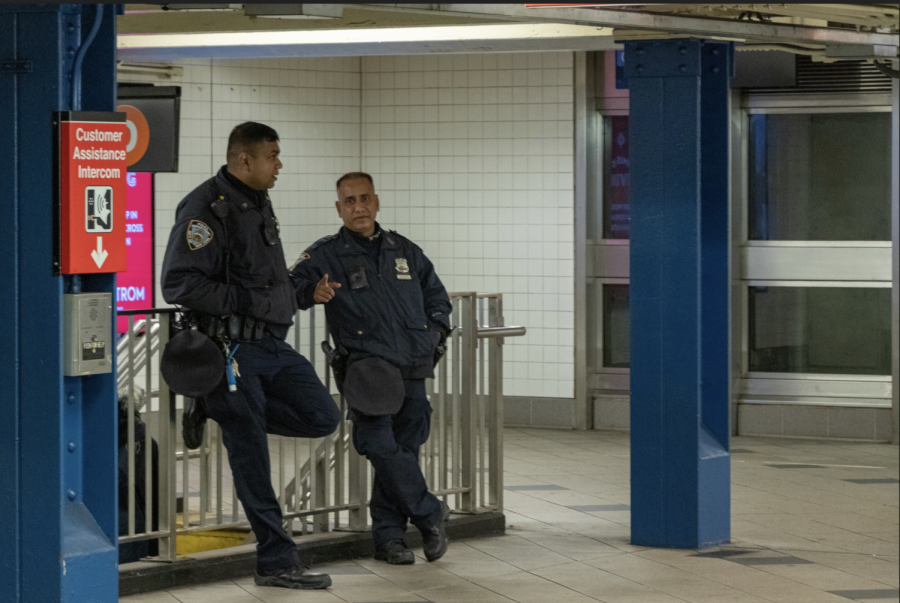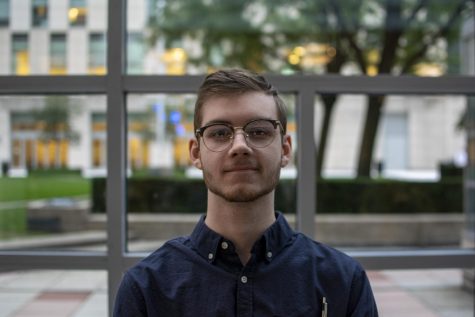‘No Cops in the Subway’ Is Not a Solution
ANDREW DRESSNER/THE OBSERVER
In the long run, legalizing fare evasion neglects to address the societal issues that give rise to it.
December 4, 2019
In the wake of city administration stepping up policing to enforce the $2.75 fare for the use of the subway, New York has seen protests and mass fare evasion across the five boroughs as citizens voice their discontent. In a city still grappling with the legacy of stop-and-frisk and facing additional controversy over its plans for incarceration, it’s no wonder that yet another policy seen to directly target lower-income people of color has met with widespread resistance. However, unlike the campaigns to close Rikers Island or end stop-and-frisk, this movement has made no coherent demands — and that’s dangerous.
For all the chants and posts about how “being broke is not a crime,” fare evasion still is — and for good reason. It’s ludicrously expensive to operate a public transit system on the scale of New York City, to the tune of over $15 billion; to say nothing of the funding necessary for renovations and repairs in the union-choked local transit industry. Fares make up 40% of the funding for the MTA and are its largest source of revenue; for an agency plagued with money problems and facing growing discontent over the deteriorating subway network, these $2.75 fares actually are crucial. Too many freeloaders jumping the turnstiles, and we’ll end up with a tragedy of the commons — a crippled system, useless to everyone, including those who were willing to risk the fines.
By no means is this meant to endorse the status quo. Yes, fare jumpers are committing a crime and putting a public good at risk, but not out of spite; when the choice is between the fare and dinner, the morality of the situation is clear. No one should have to starve for the greater good. However, this reveals the fundamental problem with the popular protests: “No cops in the subway” chants ignore this dimension entirely.
The implication of the popular slogans is this: New Yorkers have a right to evade fares, to cripple their own infrastructure, and city administration should stand by and let them.
This is why the movement is dangerous. It’s short-sighted and destructive, focused only on eliminating the short-term issue of policing without addressing the underlying systems of poverty, corruption and underfunding. Leaderless, motivated only by popular passions and immediate outrage, it represents the dangers of unmediated populist sentiment.
It doesn’t have to be like this. Solutions are apparent at every turn, from simple patches to fundamental reforms. Transportation subsidies for lower-income NYC residents, an outside investigation to break up corrupted union interests and their graft, even Washington, D.C.-style variable pricing based on distance and time — there are many avenues to a more humane resolution of this issue. The voice of the people, as of yet, has mentioned none of them.
The current wave of protests and uprisings in Ecuador, Chile, Lebanon and Hong Kong are different. These movements have long-term goals, with fundamental reforms in mind; they are less preoccupied with solving the problems of today and more focused on creating a better tomorrow. We would do well to learn from their example and refocus on truly sustainable solutions, rather than clinging to the hope that out of sight is out of mind.
Both the protesters and the MTA no doubt believe themselves to be doing important work for the greater good, but ultimately their actions are futile. Directing the anger of the moment at easy targets only blinds us to the real issues at hand and causes bigger problems down the line, when the other shoe eventually drops. In the end, the problem we should organize against is neither the policing nor the evasion, but the conditions that make both necessary.












Teodor Parolo Tasevski • Dec 11, 2019 at 1:56 pm
Completely agree with the article. Subsidies or a redesigned system are the only feasible solution, the economic and public consequences of mass fare evasion are so apparent, there is no need to mention them. I might add that getting rid of cops in the subway creates many opportunities for more crime in trains and stations.
Fordham Student • Dec 10, 2019 at 12:31 pm
This is exactly the sort of article I expect out of my white, private institution. Written by someone who clearly does not understand the movement or the struggle that black and brown New Yorkers face every single day. Lives are worth more than $2.75. Shame.
Scarlett Nopehannsen • Dec 9, 2019 at 11:24 pm
A message of caution against your haphazard analysis– it is correct that the cost of maintaining the United States’ largest public transit system is overwhelming, but the price of bringing in law enforcement is grossly inefficient and does not promise results– only, as we have seen, haphazard violence against black and brown New Yorkers and a freshly terrorized public of 8 million civilians. Yes, nearly 40% of the MTA’s revenue (not total operating budget) is collected from fares (which includes not only the subways and buses but commuter trains, bridge tolls, and tunnel fares), though how far does this money really go? The NYPD deployment to curb fare evasion will cost $249 million over the next four years, “partially financed by the $200 million the MTA is EXPECTED to save through anti-fare evasion efforts” (my emphasis, Vox, November 2019). The #FTP movement’s concise and coherent demands, most notably to remove the aforementioned multi-million-dollar police presence from our public commons and divert that money toward broken elevators and signal systems, have been lost on you. This impulse to smear more cops over a public works problem in an effort to fix it IS a problem in itself, and the tone you take toward people who cannot pay the fare leads me to believe any kindness you’ve extended these people, rhetorically, was nothing but an attempt to save face. I recommend you take the time to read Mariame Kaba, Alex Vitale, Emma Whitford’s “With Crime At Record Lows, Should NYC Have Fewer Cops” (Gothamist).